For many people – myself included – it’s thrilling to launch into a new project. From business partnerships to iterations on existing products or services, new is exciting! But, after that new-ness wears off, many people are left searching for motivation. That means either finding new ideas or turning to timeless wisdom for reassurance. Whether you’re in the professional speaking world or not, one consistent source of that encouragement is famous motivational speakers.
If you’re new to motivational speeches, you’ll soon discover what those of us in the profession have known for years, that there are infinite concepts and ideas waiting to be mined. It’s also important to note that every single day, thousands of these ideas are shared in unique and uplifting ways by newly-emerged thought leaders who have much to teach and many ways to inspire.
With that in mind, let’s look at 10 of the most commonly shared ideas from the last 20 years of thought leadership. What you’ll see immediately is that you can use many of these ideas in your own life, regardless of how many obstacles you encounter and whether or not you want to try your hand at motivational speaking yourself someday.
- Lead with dignity and love, even when the people around you don’t.
- Always accept the truth, in good times and bad.
- If at first you don’t succeed try, try, again.
- If someone’s criticism isn’t constructive, brush it off.
- Follow the things you’re passionate about. Life’s too short for anything else.
- Embrace the things that make you unique.
- Put your money where your mouth is, especially with your dreams.
- Never undervalue your true friends and family.
- Approach change as a chance to improve.
- Define yourself by your terms, not by labels others give you.
Lead with dignity and love, even when the people around you don’t.
First and foremost, always remember to take the high road. In their personal lives and professional experiences, some of the most renowned famous motivational speakers are the ones that rose above adversity instead of giving in to their frustration with it. When people attacked them, they met that violence with calm. When people around them wanted to give up, they met that despair with resilience. Likewise, in your own life, aim to rise above as often as you can. As it becomes a habit, not only will it ensure that you approach problems level-headedly. It will also guarantee others remember you in a positive light, setting you up for personal and professional prosperity down the road.
Speaker Highlight: Dr. Bernice King
Few great motivational speakers have had a more tumultuous start in life than Dr. Bernice King. who was just five years old when her father, Dr. Martin Luther King, was assassinated. For many people, a tragedy of this scale would have been life-shattering, but King was determined not just to rise above it but also make sure his messages about love and activism were effectively carried forward.
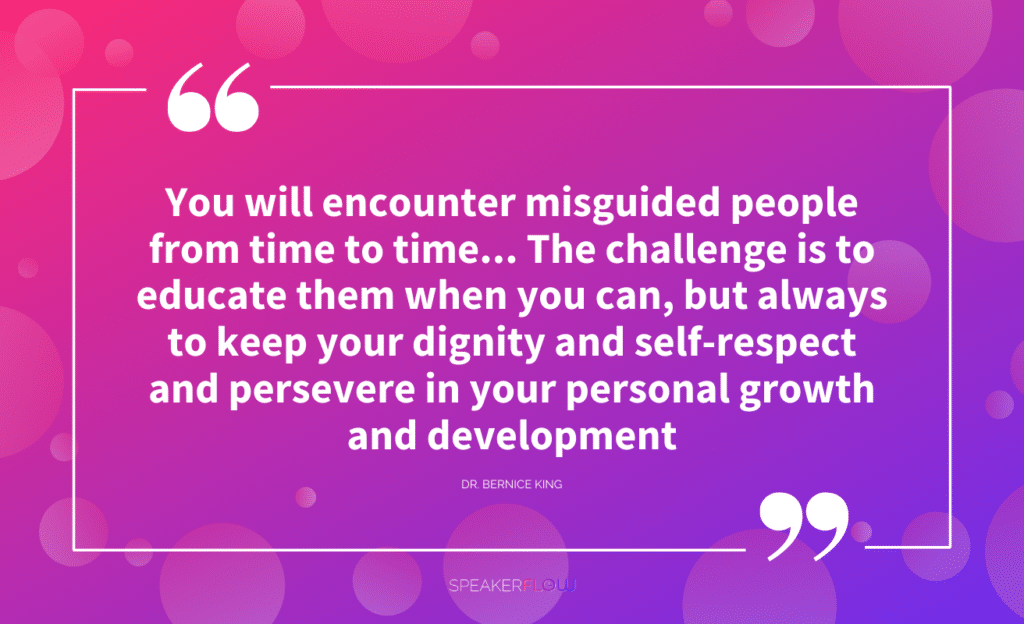
Today, Dr. King is a perfect example of leading with dignity and love, both personally and professionally. For one thing, over the last several decades, she’s continued to educate and inform audiences around the world about the importance of tackling racism through calm and purposeful activism and constant love, as hard as it can be to do so.
Dr. King has also continued to be a fierce advocate for racial justice and equality. Even despite the personal pain she and her family experienced at the hands of those opposed to these causes, she’s continued to lead with dignity and discipline, saying, “You will encounter misguided people from time to time. That’s part of life. The challenge is to educate them when you can, but always to keep your dignity and self-respect and persevere in your personal growth and development.”
Always accept the truth, in good times and bad.
The second lesson shared by most famous motivational speakers is a simple one: always face the truth. In tough times especially, tackling challenges head-on can be incredibly difficult to do. In the moment, it might feel easier to pretend it’s not as bad as others are saying or even ignore the problem entirely. However, in the long run, honesty – with yourself and others – is always best. Even if “the truth hurts,” accepting it is the first step to moving towards something better. It might be small, like starting an exercise routine, or significant, like leaving a bad relationship. Either way, understanding the positives and negatives of a situation in detail is guaranteed to help you progress quickly. Plus, you’re much less likely to make the same mistake in the future.
Speaker Highlight: Tony Robbins
Few speakers have taken this advice to heart quite like Tony Robbins. Known for his blunt and candid approach to speaking, Robbins has delved deeply into the dynamics of power over the course of his legendary career, and his words about the struggle to find purpose resonate more than ever.
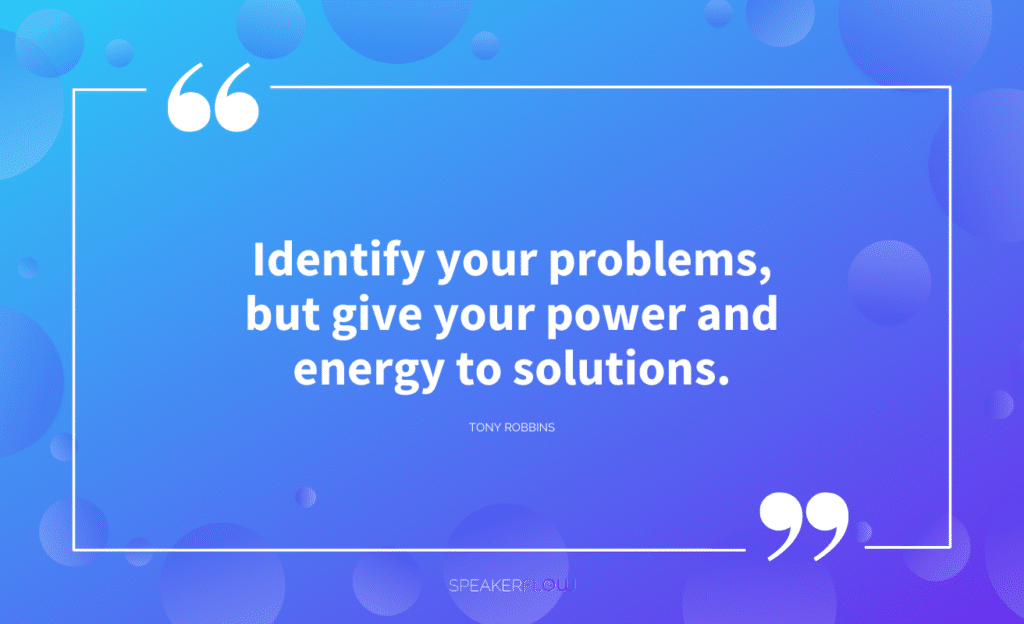
Through many of Robbins’ presentations, in fact, the message is consistent. In it, he separates the world into two distinct areas, problems and solutions, before diving into tactics for getting out of the former arena to find the latter. He also continually stresses the importance of execution. To hear him tell it, “Identify your problems, but give your power and energy to solutions.”
In short, many problems, although challenging, can eventually lead to success and happiness, provided you see them for what they are. So, in good times and in bad, remember these two steps: first, identify the problem(s), and second, focus on finding solutions.
If at first you don’t succeed try, try, again.
Third on our list of lessons from famous motivational speakers is an age-old classic: try, try again. Coined by American educator Thomas H. Palmer in the mid-1800s, the original phrase states “’Tis a lesson you should heed, Try, try again; If at first you don’t succeed, Try, try again.” In other words, failure is unavoidable and, at one time or another, we’re all bound to trip and fall. The most important thing to remember when these times occur is to stand back up. Like the last lesson – facing hard truths – it may not be easy to “try, try again,” but if you want to meet your goals, it’s imperative that you acknowledge your failures. Then, learn what you can from them, so you can get closer to (or meet!) your goal the next time around.
Speaker Highlight: Nick Vujicic
Although many famous motivational speakers can speak to this lesson with confidence, one standout example is Nick Vujicic. Born without arms or legs, Vujicic has faced countless obstacles in his life. From the physical challenges of his disability to the social challenges and bullying he experienced while in school, Vujicic is no stranger to hardship and feeling unsure about how to conquer it to meet his goals.
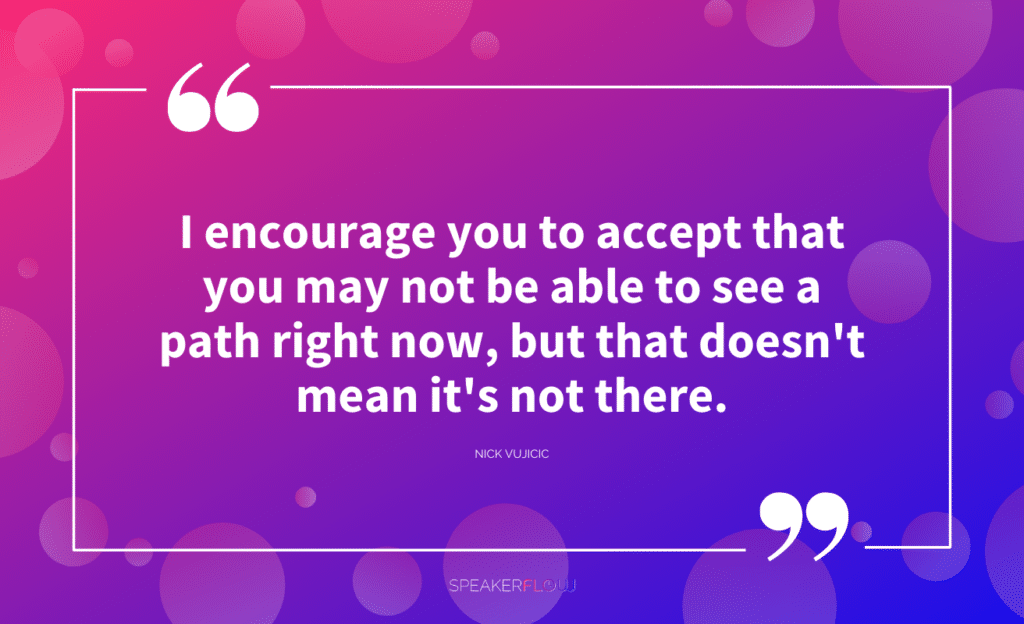
That said, he’s also a shining model for the lesson of always trying again. Today, Vucjicic is not only a world-renowned motivational speaker, author, and entrepreneur. He’s also an anti-bullying advocate, the creator of the founder and CEO of the non-profit ministry Life Without Limbs, a proud father of four children.
Above all, despite his early challenges, he continues to “inspire and equip the world to know that we all can rise above adversity and overcome every disability of the heart and mind,” saying in one of his speeches, “I encourage you to accept that you may not be able to see a path right now, but that doesn’t mean it’s not there.”
If someone’s criticism isn’t constructive, brush it off.
Besides being too hard on yourself, another thing to conquer is criticism from others. For many famous motivational speakers, their journeys started with the pursuit of a dream. For some, this involved physical feats, like Olympic level sports victories. Others faced social obstacles, like racism or sexism, as the people around them insisted, “Your dream is impossible.” In any case, these speakers accomplished their goals when they learned to listen to their mentors, not their critics. In your own life, the same outcome is possible as long as you surround yourself with supportive people and keep your eye on your own goals.
Speaker Highlight: Bréne Brown
If you’ve heard Bréne Brown speak, you know that she’s all about compassion and empathy in virtually every situation. But, she’s also about being true to these values, yourself, and your dreams even when the people around you try to put you down as a result.
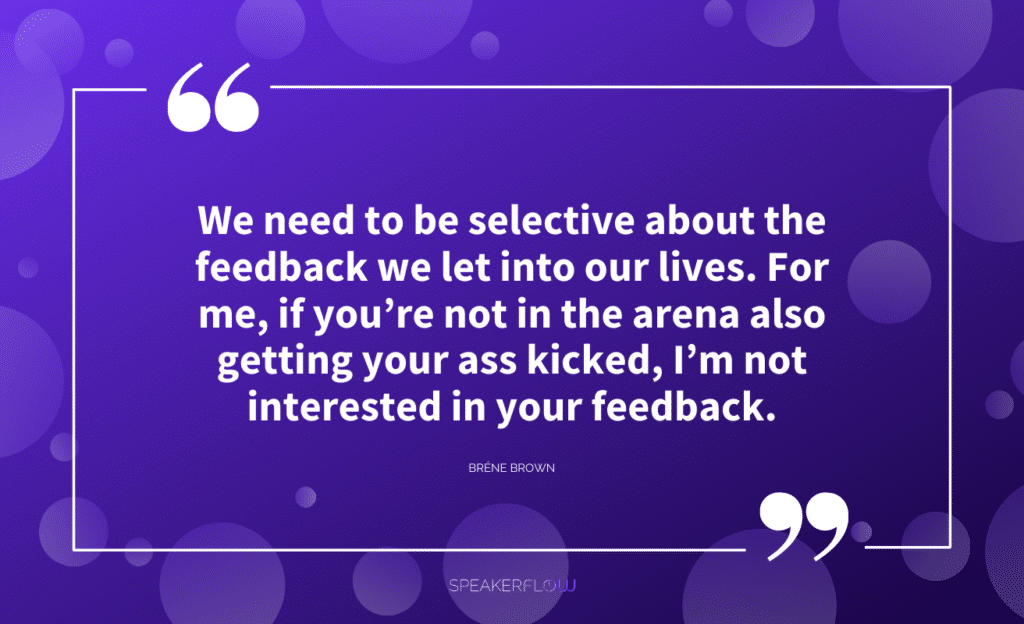
In her book, Rising Strong: How the Ability to Reset Transforms the Way We Live, Love, Parent, and Lead, she argues the following:
“A lot of cheap seats in the arena are filled with people who never venture onto the floor. They just hurl mean-spirited criticisms and put-downs from a safe distance. The problem is, when we stop caring what people think and stop feeling hurt by cruelty, we lose our ability to connect. But when we’re defined by what people think, we lose the courage to be vulnerable. Therefore, we need to be selective about the feedback we let into our lives. For me, if you’re not in the arena also getting your ass kicked, I’m not interested in your feedback.”
To put it simply, when it comes to brushing aside non-constructive criticism, Brown sums it up best. If your critic isn’t “in the arena” with you, don’t worry about what they have to say.
Follow the things you’re passionate about. Life’s too short for anything else.
The fifth lesson shared by most famous motivational speakers is to pursue your passions. Obviously, passion looks different for everyone, and we all have different dreams. But, the question you have to ask yourself is, “What am I passionate about?”. After all, in the long run, living someone else’s plan or dream for you will never be as fulfilling as doing what you truly love. So, whether it’s spending more time with your family or climbing the ladder in your profession, focus on what excites you the most. Then, strive to make that the priority in everything you do.
Speaker Highlight: Simon Sinek
One speaker that’s all about passion is Simon Sinek. Although most of Sinek’s motivational speeches revolve around leadership in the workplace, he’s hardly a “rah-rah” kind of guy. Instead, he stresses passion and emotion and the powerful role these emotions can play in the workplace when supported and exercised well.
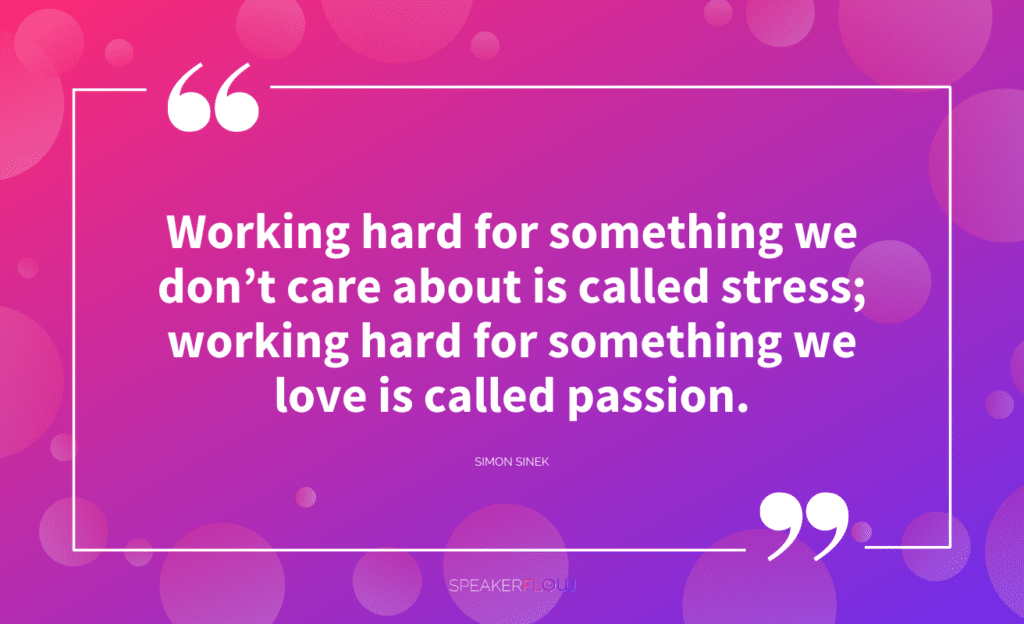
Sinek also stresses that passion especially goes well beyond the workplace. Goals are goals and happiness is happiness – no matter where you’re talking about it. He also argues that happiness and fulfillment are goals for most of us, and if you’re doing something you’re passionate about, the amount of energy you put into meeting those goals will increase your odds of success. Plus, you’ll be able to enjoy the journey as well as the outcome. Win, win!
Long story short, Sinek is a practical and actionable speaker – no doubt about it. But, he’s also a huge advocate and example for the role professional passion plays in personal happiness. In his words, “Working hard for something we don’t care about is called stress; working hard for something we love is called passion.” His advice? Follow your passion and personal and professional prosperity will follow.
Embrace the things that make you unique.
Sixth on our list of lessons from famous motivational speakers is a lesson most of us take all of our lives to learn: embrace what makes you special. Nowadays, especially, social media and advertising are full of labels for what you “should” look like, wear, or do if you want to fit in. But, ultimately, the things about you that don’t match those labels are the things that make you…well, you. They’re what make you different, contribute to your unique experiences, and help shape the way you impact the people around you. Consequently, leaning into them won’t be comfortable at first, but it will almost inevitably pay off in your personal happiness. Plus, I can almost guarantee there’s someone out there with the same insecurities you’re facing who could gain confidence and purpose from seeing your example. What’s not to love about that, right? 💓
Speaker Highlight: Lizzie Velásquez
Although every speaker in this list has their own way of standing out, one of my personal favorites is Lizzie Velásquez. Born with Marfanoid–progeroid–lipodystrophy syndrome, a condition that restricts her size and weight, one might assume Velásquez to be shy or self-conscious. Instead, she’s overcome bullying and body shaming, sharing her compassion and optimism and embracing her condition to inspire others to overcome their own obstacles.
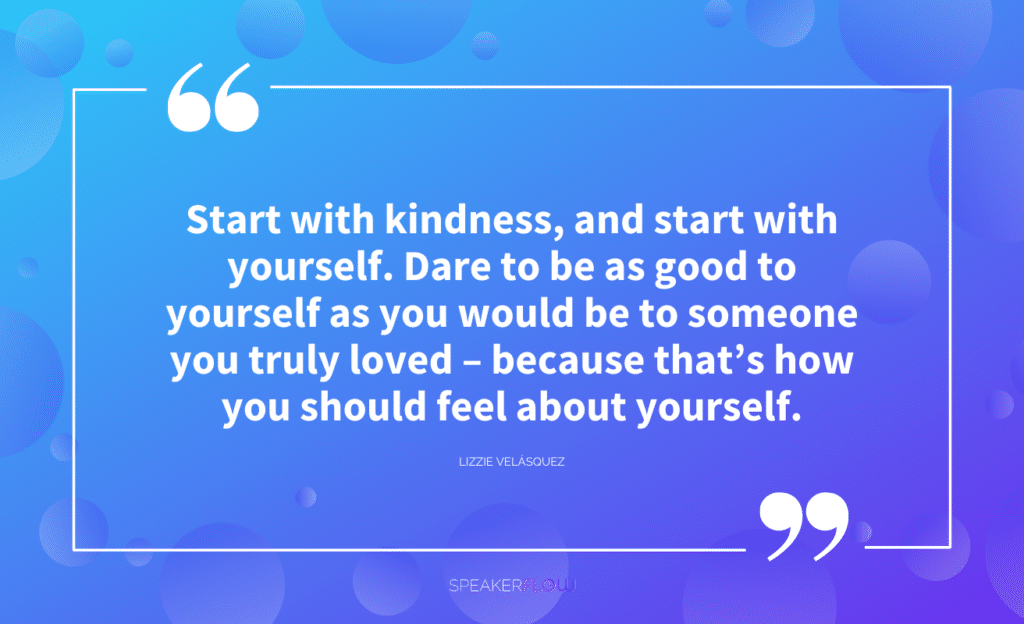
In your own life, the obstacles you’re facing (or will face in the future) will vary, but Velásquez’s message still applies. Starting with yourself, kindness is timeless, and using it effectively can be a powerful weapon when it comes to achieving goals and weathering hard times. As Velásquez states, “Start with kindness and start with yourself. Dare to be as good to yourself as you would be to someone you truly loved – because that’s how you should feel about yourself. Dare to treat yourself as a dear and precious friend.”
Put your money where your mouth is, especially with your dreams.
Another common lesson famous motivational speakers share is to match your passion with action. When thinking about the future, it can be tempting to think in “someday”s. For example, you may want to think “Someday, I’ll have my dream job,” “Someday, I’ll meet my fitness goals,” or “Someday, I’ll book that trip I’ve always wanted to take.” But, in reality, dreaming for certain outcomes will only get you so far. You have to also remember the old saying, “Actions speak louder than words,” and make a plan to make those dreams come true.
Speaker Highlight: Gary Vaynerchuk
One group of people that knows big dreams demand hard work is entrepreneurs, including e-commerce and digital business guru Gary Vaynerchuk. Also known as “Gary V,” Vaynerchuk takes a gritty approach to hard work, saying “Without hustle, your talent will only get you so far…. It’s easy to dream about it, but much harder to execute it.” He also argues “Stop focusing on dumb sh*t. Don’t be afraid to break things…. Don’t aim for perfect. And whatever you do, keep moving.”
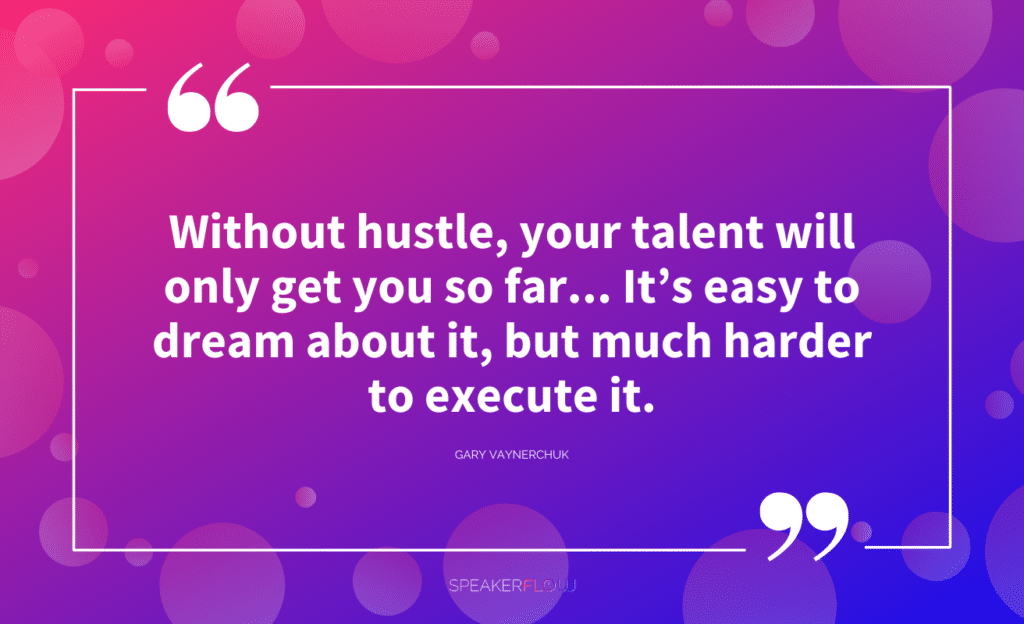
Essentially, Vaynerchuk takes the well-known Kate Sanborn quote, “Genius is 1% inspiration and 99% perspiration,” and amps it up. Whatever your goals are – and especially if you’re an entrepreneur, like most professional speakers – don’t waste time talking about what you want to be doing if you’re not going to follow through. Even if it takes weeks, months, even years, keep your head down and work hard if you know what you want. Take it from us if not from Vaynerchuk. After two straight years of day-in and day-out hustle, we know firsthand that it pays off. 🚀
Never undervalue your true friends and family.
The eighth lesson shared by most famous motivational speakers is both personal and professional, namely to surround yourself with friends and family that truly care about you and want you to succeed. It’s easy for anyone to feel pride in someone that’s already accomplished their goals. But, the people you need at your side are the ones that will help when you’re still working to meet those goals. That way, even when you’re rich and famous – or whatever you want to be – you know they’ll still be there for you and honored to call you a friend.
Speaker Highlight: Oprah Winfrey
Like many of the lessons in this list, valuing your true supporters is advice you’ll hear from many famous motivational speakers, including Oprah Winfrey. Born in rural Mississippi, Winfrey faced a wide range of barriers to her eventual success. These included poverty, sexual assault, and racism, all of which contributed to her family’s move to Nashville in the 1960s where she began working in radio and television broadcasting.
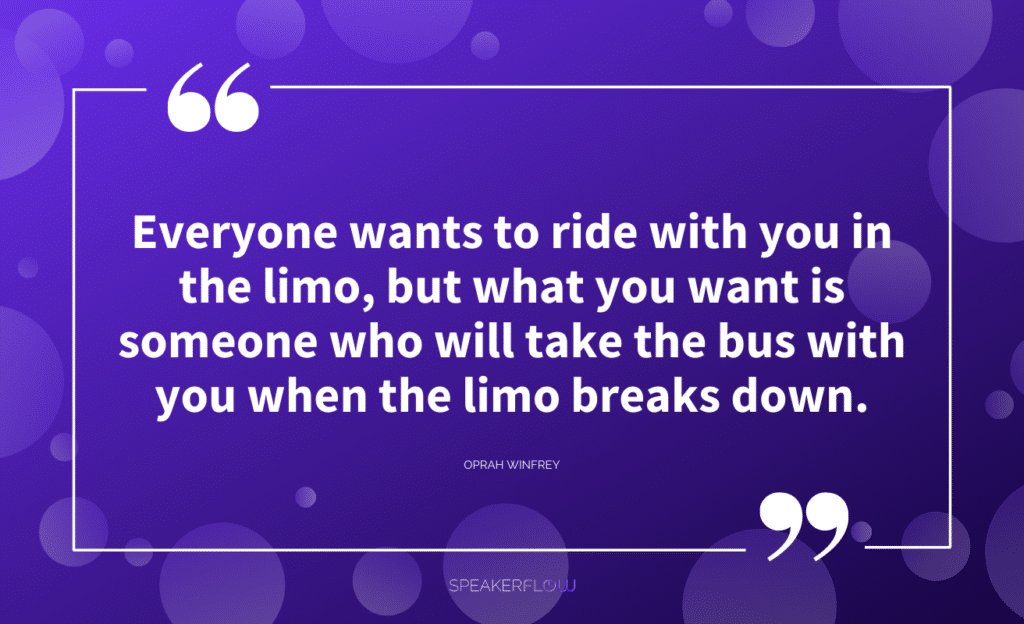
Since then, Winfrey has become one of the most successful and well known public figures in the United States. Today, she remains not only the first Black female host of a nationally syndicated daily talk show but also the first Black female billionaire in the U.S., paving the way for countless other Black women in the decades since her rise to fame.
Yet, despite this success, Winfrey’s never forgotten who helped her achieve it, saying, “Everyone wants to ride with you in the limo, but what you want is someone who will take the bus with you when the limo breaks down.” In other words, like Winfrey, keep close the people who knew you before your success and had your back nonetheless. Whether or not you faced the same obstacles as she did, those are the kind of people you can depend on always.
Approach change as a chance to improve.
Ninth on our list of lessons from famous motivational speakers is the importance of embracing change. For the vast majority of people, change is stressful, particularly when you can’t control it. However, although it can be uncomfortable, change can ultimately be a chance for you to improve. Maybe it’s transitioning to a new job. Maybe it’s going out of your comfort zone to be more social or try learning a new skill. Either way, embracing change means being humble and always doing your best to approach uncertain times with a problem-solving attitude rather than a pessimistic one. Regardless of age, experience, or industry, we can all benefit from that.
Speaker Highlight: Simon T. Bailey
Admittedly, you may be thinking, “I’ve heard all of this before” and that’s fair! The phrases, “change is hard” and “change is stressful” pop up in countless motivational speeches.
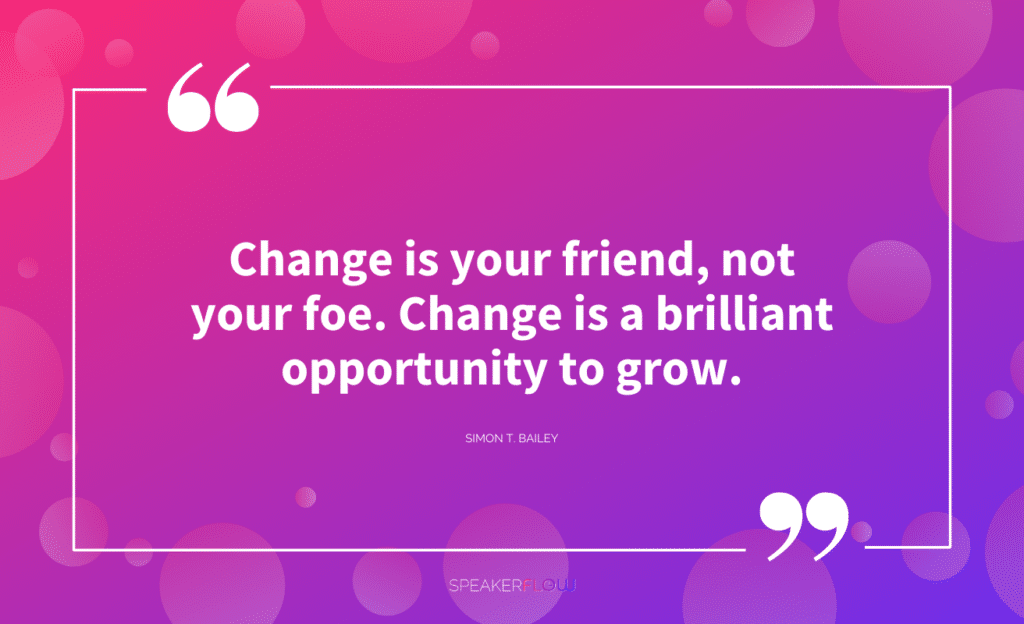
That said, one speaker that has always added his own unique approach to timeless truths is Simon T. Bailey. As an international speaker, author, and coach, Bailey’s goal is to help his clients and audiences find their purpose and, in doing so, embrace the changes and challenges that come with the search process. To hear him tell it, “Change is your friend, not your foe. Change is a brilliant opportunity to grow.”
Bailey also argues the rewards that come from accepting the twists and turns life throws at you. In doing so, he maintains that you’ll be able to find your “spark.” From there, you’ll find your joy, and “When you find your joy, you find your voice. When you find your voice, you find your freedom.”
Summarily, welcoming change takes practice, and adapting to change takes time. But, in the long run, doing both always comes with a huge return on your investment in life and at work.
Define yourself by your terms, not by labels others give you.
Last – but arguably the most important – of our lessons from famous motivational speakers is the importance of being true to yourself. Wherever you look, it’s easy to compare yourself to the people around you, whether you do so consciously or not. Looks, career choices, personality – all of it tends to fall into “boxes” for how “normal” people tend to live. But, deep down, none of us really fit into those boxes, and in one way or another, we’re all a little weird. With that in mind, the final lesson we can take from famous motivational speakers is to avoid putting up walls to protect yourself or force yourself to fit a societal mold. Just be yourself, work hard in pursuit of your dreams, and success will come in time.
Speaker Highlight: Karamo Brown
One speaker that’s exceptionally familiar with the pressure of societal labels is Karamo Brown. As a gay, Black man, he knows more than most speakers the pressures that one can experience, personally and professionally, when you stand out. However, he also knows the importance of standing tall, sticking up for yourself, and being open about who you truly are, even when it may seem safer to build metaphorical walls to keep others’ judgment or hurtful opinions out.
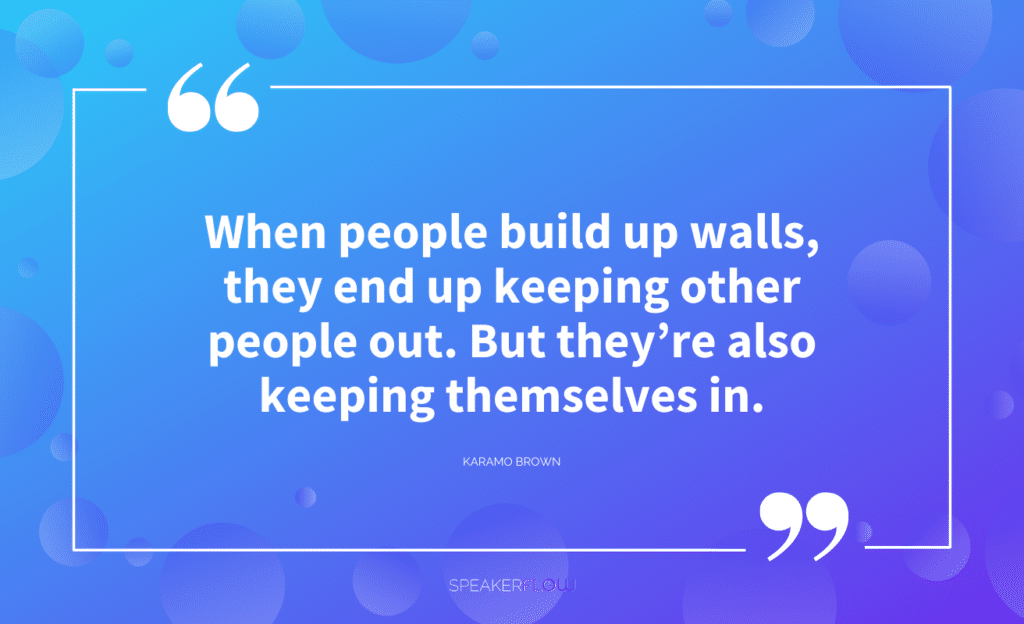
In an episode of Queer Eye, a reality show on which Brown is one of the five hosts, for example, he argues, “When people build up walls, they end up keeping other people out. But they’re also keeping themselves in.” In the same way, your own dreams, goals, and personality shouldn’t depend on others. They also shouldn’t be defined by what’s comfortable or what’s traditional. That just limits your potential!
Instead, they should be based on what you’re passionate about and the labels that most accurately reflect your truth. That way, in your personal and professional life, you can be confident in who you are and realize your goals in no time. 💓
Hopefully, this collection of lessons – and the amazing famous motivational speakers behind them – helps you stay motivated as you work towards your own dreams. For more inspiration, check out our previous blog, “10 Motivational Speech Examples To Inspire You Today”.
Additionally, for speaker-specific resources, visit our free Resource Library or connect with us for a quick discovery call. We’re already excited to meet you! 👋





